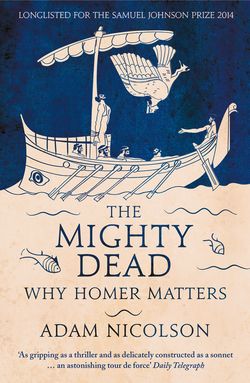Читать книгу The Mighty Dead: Why Homer Matters - Adam Nicolson - Страница 15
SIX Homer the Strange
ОглавлениеTHE PITHEKOUSSAI WINE CUP marks the limits of the written Homer. It is the edge of a time-cliff: step beyond it, further back in time, and the ground falls away. In that disturbingly airy and insubstantial world out beyond the cliff face, before the eighth century BC, Homer is unwritten, existing only in the minds of those who knew him.
It is a disorientating condition for our modern culture: how can something of such importance and richness have had no material form? How can the Greeks have trusted so completely to their minds? At home in Scotland, I sometimes go up to the edge of the sea-cliff above the house, looking down to the fulmars circling in the four hundred feet of air below me. Again and again, the birds cut their effortless discs in that space, turning in perfect, repetitive circles, in and out of the sunlight, scarcely adjusting a feather to the eddies, but calm and self-possessed in all the mutability around them; and I have thought that in that fulmar-flight there may be a model of the Homeric frame of mind. You don’t need to fix something to know it. You know it by doing it again and again, never quite the same, never quite differently. You may even find, in that tiller-tweaking mobility – a slight adjustment here, another there – that you know things which the rigid and the fixed could never hope to know. The flight is alive in the flying, not in any record of it. And perhaps we, not Homer, are the aberration. Of about three thousand languages spoken today, seventy-eight have a written literature. The rest exist in the mind and the mouth. Language – man – is essentially oral.
Until the twentieth century, no one had any idea that Homer might have existed in this strange and immaterial form. It was the assumption that Homer, like other poets, wrote his poetry. Virgil, Dante and Milton were merely following in his footsteps. The only debate was over why these written poems were in places written so badly. Why had he not written them better? Both the Iliad and the Odyssey are riddled with internal contradictions. No self-respecting poet would allow such clumsiness.
The great eighteenth-century Cambridge scholar Richard Bentley – the dullest man alive, according to Alexander Pope, ‘that microscope of Wit,/Sees hairs and pores, examines bit by bit’ – thought that Homer wrote
a sequel of songs and Rhapsodies, to be sung by himself for small earnings and good cheer, at festivals and other days of Merriment; the Ilias he made for the men and the Odysseis for the other Sex. These loose songs were not connected together in the form of an epic poem till … about 500 years after.
Homer was no longer a genius; he was the work of an editor-collector, perhaps not entirely unlike Professor Bentley himself. Later microscopes of wit thought there was not even one author, but a string of minor folk poets whose efforts had been brought together by the great Athenian or even Alexandrian editor-scholars. The Prince of Poets had been dethroned. The scholars had won. And so the nineteenth century was animated by the debates between Analysts and Unitarians, those who thought Homer had been many and those who continued to maintain that he was one great genius.
The argument lasted for over a century, largely because of the sense of vertigo a multiple Homer induced. If Homer was dissolved into a sequence of folk-poets, one of the greatest monuments of Western civilisation no longer existed. Nevertheless, these were the preconditions for the great discoveries about Homer made in the early twentieth century by the most brilliant man ever to have loved him.
Milman Parry is a god of Homer studies. No one else has made Homeric realities quite so disturbingly clear. Photographs show what his contemporaries described, a taut, focused head, a man ‘quiet in manner, incisive in speech, intense in everything he did’. There was nothing precious or elitist about him, and his life and mind ranged widely. For a year he was a poultry farmer. Along with the technicians at the Sound Specialties Company of Waterbury, Connecticut, he was the first to develop recording apparatus which didn’t have to be interrupted every four minutes to change the disc. He took his wife and children with him on his great recording adventures in the Balkans, and at night sang songs to them which mimicked and drew on the epic poems he had heard in the day. At Harvard, where he became an assistant professor, he took to washing his huge white dogs in the main drinking-water reservoir for the city, stalking about the campus in a large black hat with ‘an aura of the Latin quarter’ about him, regaling his students with the poetry of Laforgue, Apollinaire, Eliot and e.e. cummings. Supremely multilingual, at home in Serbo-Croat, writing his first articles and papers on Homer in French, this was the man who pulled Homer back from its academic desert into life.
Milman Parry, 1902-35
